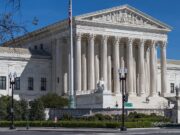A recent, positive development in The Buckeye Institute v. Internal Revenue Service (“Buckeye”) provides another important indicator that defenders of civil liberties have a potent new precedent with which to challenge unconstitutional disclosure laws.
To recap how we got here, public policy think tank The Buckeye Institute filed suit challenging a law that compels nonprofits to reveal the private information of their largest donors to the IRS every year, even though the IRS admits that it doesn’t need this information.
These requirements chill and suppress speech by creating risk for supporters who might suffer retribution if such disclosures revealed their support for a given nonprofit’s mission. Buckeye itself has been subjected to harassment for its position on public policy issues, and the IRS audited Buckeye immediately following its public opposition to Medicaid expansion in 2013. Such backlash would make any reasonable person wary about supporting Buckeye—or other organizations that take positions on hotly contested policy debates—if doing so requires disclosing that support.
Now, painfully aware of the harm that onerous disclosure requirements impose, Buckeye challenges this law on First Amendment grounds. The Institute for Free Speech and Buckeye’s in-house attorneys represent the organization in this litigation. Our goal is to challenge and eliminate what we believe is an unconstitutional disclosure requirement that violates the First Amendment speech and associational rights of Buckeye and its donors.
The U.S. Supreme Court has already struck down a similar disclosure mandate in the landmark 2021 case Americans for Prosperity Foundation v. Bonta (“AFPF”). There, the Court held that a California regulation requiring non-profit organizations disclose the names of their significant donors to the State was not narrowly tailored to the government’s interest. “When it comes to a person’s beliefs and associations,” the Court explained, “broad and sweeping state inquiries into these protected areas discourage citizens from exercising rights protected by the Constitution.” 141 S. Ct. 2373, 2384 (2021) (cleaned up).
The California rule violated the First Amendment because it required thousands of charities to disclose sensitive donor information every year “even though that information will become relevant in only a small number of cases.” Id. at 2387. This “dramatic mismatch” between the scope of the disclosure rule and what the state actually needed ultimately proved fatal. Id. at 2386.
AFPF was a monumental decision for two reasons. First, it clarified that a more strenuous standard of review known as “exacting scrutiny” requires that the government prove that a law is narrowly tailored to its purported interest. Second, AFPF held that exacting scrutiny applies to all kinds of disclosure laws.
In Buckeye, the government argued that AFPF doesn’t apply because the disclosure rule in question is a condition on a tax subsidy (i.e. the Buckeye’s tax-exempt status), rather than a compelled disclosure. The argument goes something like this: Because Buckeye voluntarily accepts tax-exempt status, it could avoid disclosing its donors by declining the tax exemption. Thus, its mandatory disclosure law does not mandate disclosure at all, and so AFPF’s requirement that disclosure laws be narrowly tailored does not apply. As further explained in this pre-AFPF blog post, such a trade would “remov[e] an important free speech limit on government power” and cause “a massive problem” for First Amendment rights. That’s because “almost all Americans take tax deductions, receive governmental benefits, or participate in governmental programs.”
This is a critical issue. If a court accepts the government’s argument that the law is not a compelled disclosure, the court would apply a weaker standard of review. Rather than having to prove that the law is narrowly tailored to a substantial government interest, the government need only show that requiring disclosure is reasonable—a deferential standard that is difficult for any party challenging a statute to overcome.
However, on November 9th, Judge Michael H. Watson of the U.S. District Court for the Southern District of Ohio rejected the government’s argument and ruled that exacting scrutiny is the appropriate level of review to apply to the law in question in the Buckeye case. Relying on AFPF, Judge Watson’s order shifts the burden to the IRS. The government must prove that this law is narrowly tailored to achieve the government’s interest in tax enforcement and administration. That means the government must justify collecting sensitive donor information from every 501(c)(3) non-profit every year, rather than adopting a rule requiring disclosures only under very particular circumstances. And under AFPF, the government can’t rely on weak rationales such as administrative convenience or efficiency to defend its universal, up-front collection.
This case provides another opportunity for a federal court to protect donor privacy by implementing AFPF’s exacting scrutiny standard in a way that has “teeth.” The Institute for Free Speech recently won a case in the Tenth Circuit, Wyoming Gun Owners v. Buchanan, where the court did just that.
There, for the first time, a federal circuit court applied AFPF’s exacting scrutiny standard and required the narrow tailoring that pushes back against overbroad disclosure regimes. We hope that Buckeye will become another example of AFPF’s reach, helping to safeguard the political speech and associational rights enshrined in the First Amendment.














